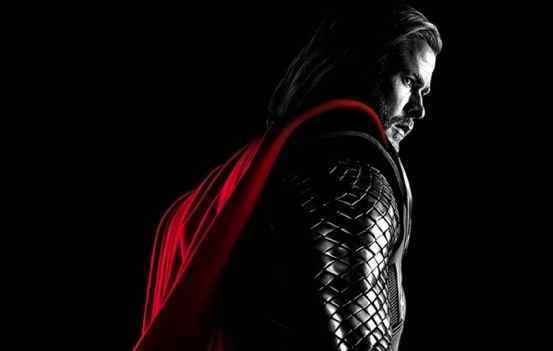Thor's once again ready for some arse-smitin'.
Without any reservations or holding anything back, I can confidently say that "Thor: The Dark World" is the best Thor film to date, which really isn't saying much considering that this is only the second one. The film, as expected from Marvel Studios, is ripe with spontaneous humor, effective one-liners, and smirk-inspiring references that you may think that Marvel's head honchos have seen "Man of Steel", looked at each other in utter disbelief specifically during the climax, and contacted, within minutes, some of their friends in the comedy business. Lesson learned: never trust a Marvel trailer, for it will tease you with the prospect of sheer ominousness, but will almost always bring you an all-smiling kind of escapist popcorn stuff.
Though the film is with a subtitle that seems to suggest a more brooding sense of adventure for the 'Thunder God' himself, "Thor: The Dark World" is a very fun and innocuous 'might and magic' outing that's as relentless in its action as it is in its comedy. Plus, you will know that you're in for a ridiculous type of enjoyment when one of the first things you will see in the first 10 minutes or so of the film is a stark naked Stellan Skarsgard running aimlessly around the Stonehenge while parading his very Swedish behind.
Also, for the first time, we're given an otherworldly villain that's not really a kin to our long-haired hero. His name's Malekith (Christopher Eccleston), a dark elf who wants to destroy all the realms and revert the entire universe back to its dark state because, like rats, his kind is most comfortable in the dark. Of course, no matter what it takes, this will not be allowed by the future king of Asgard, or by the incumbent Odin (Anthony Hopkins), or even, surprise surprise, by the god of mischief himself: Loki (Tom Hiddleston in a definite scene-stealer).
For someone who's really not into the whole fantasy and sci-fi stuff, "Thor: The Dark World", in some regards, may come across as something too jargon-y, especially when Natalie Portman's Jane Foster starts to talk about gravitational theories and whatnot. On the other hand, though, coming in as a fantasy fan will surely be a treat all on itself because, compared to the first film, Asgard (plus the other realms) is in fuller view this time around, and we're also finally able to behold its sheer size and very Rivendell-esque aesthetic.
In addition, the film is also more well-endowed in its action sequences, though I can definitely see the visual dissonance that seems to suppress the film's search for a kind of identity. I see a group of bearded warriors engaging in a very fantastical skirmish and "The Lord of the Rings" is what immediately enters my mind. I see a metal-hulled ship that's being shot at by giant laser guns and "Star Wars" involuntarily pops up in my head. Though it is but given that "Thor", in its own right, already has a fairly established universe in the comic books, I still just can't buy how it was realized on-screen, and it also doesn't quite help that director Alan Taylor is a "Game of Thrones" luminary.
On a more positive note, though, the film's climactic set piece, which sees Thor and Malekith do battle in a highly spasmodic gravitational condition (in layman's term, they're fighting while being spontaneously teleported from one realm to another), is on par with "Iron Man 3's" firecracker of a payoff.
Chris Hemsworth, in his third outing as the titular superhero, is more effortless than ever in Thor's otherwise unwieldy boots and heavy garb while holding the even heavier Mjolnir, though him being completely overshadowed by Hiddleston's even more effortless portrayal of the unpredictable Loki just can't simply be avoided. This time around, after being defeated in "The Avengers" by, well, the Avengers, Loki is the obvious victor, performance-wise.
And the ending? Well, I can't believe what I've just seen, but did Kevin Feige and company just borrow from "G.I. Joe: The Rise of Cobra's" playbook? It's a great sleight of hand (the ending, that is), sure, but I've seen it before, and sadly in an infinitely lesser film. Does this suggest that Marvel's creatives are finally reeling? In terms of the overall quality of "Thor: The Dark World", it's quite evident that, no, it's not anywhere near that, but the ending sure speaks a lot about the fact that even air-lifting Joss Whedon into the set for emergency rewrites just couldn't save a relatively lousy ending.
Nonetheless, the film is still good enough for what it is, and has some nice enough surprises and in-jokes up its sleeve to make it adhere more tightly to the ginormous hull of the Marvel Cinematic Universe. And, man, just seeing Heimdall the Gatekeeper (Idris Elba) single-handedly kick some dark elf ass secures "Thor: The Dark World" an automatic spot in my list as one of the more truly enjoyable Marvel movies to date. Again, that's not saying much, but the film sure is staggering in scope, which has pumped me up even more for the astronomical degree of awesome that's in store for us when "The Avengers: Age of Ultron" finally rears its head.
FINAL RATING








